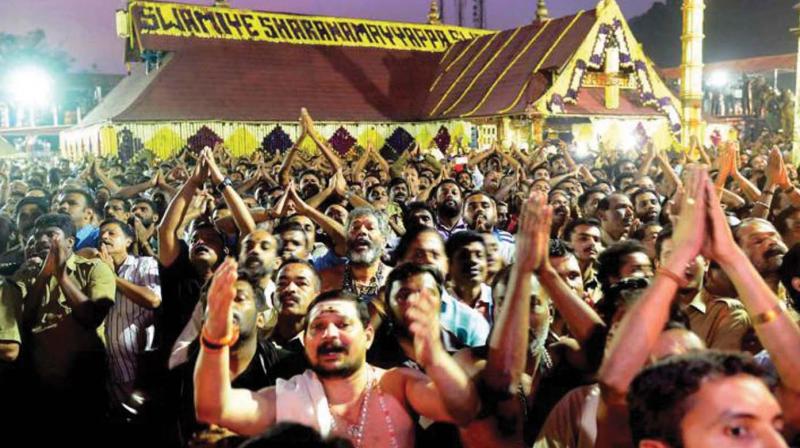When faith hurts
Making them go through difficulties as penance is considered unavoidable to purge their character

In many religious traditions around the world, faith is sometimes intertwined with infliction of physical and psychological suffering on the believer by hurting the body. This is basically a feature of mostly patriarchal religions which condemn the body as an obstacle on the path towards God. Such rituals have their source in asceticism that emphasises otherworldly dimensions. Making the devotees go through difficulties as penance is considered unavoidable to purge their character and souls.
Catholics used to practise self-flagellation, hitting oneself with a whip, in remembrance of the suffering during the passion of Christ. Even Martin Luther, the founder of the Lutheran Church, is believed to have done it regularly. Starving the body through fasting is a preferred religious practice. Christians resort to fasting during Lent, Muslims fast in the month of Ramzan from dawn to dusk, and fasting is part of various Hindu festivals. Though moderate fasting is good for health, the forced religious fasting rituals take it to the extremes, triggering trouble.
In India, with the advent of the ascetic streak of Brahminical and patriarchal religion, rituals that hurt or punish the body started gaining ground in the customs of various Hindu sects. The stories in Hindu mythology about sages doing tapasya without food and water, standing on one leg, or amidst blazing Panchagni fire, point to the importance of the belief in ‘hurt’ as a tool to strengthen faith. Pilgrimages to the places of worship in all religions also involve a series of tough phases including stressful rituals and tricky terrains to traverse.
Originally, the Goddess traditions celebrated the world itself as divine rather than illusory, and did not see the body and related aspects as impure. An exception is the practice of some Kali worshippers spilling blood by harming the body in one way or the other. The controversial ritual Garudan Thookam performed in some Kali temples is an example. In Thookkam, the devotee dangles from a metal hook that pierces the skin and flesh.
In Murugan or Subramanya temples, piercing the tongue and cheeks has been an old custom. I happened to witness the rituals of Ulloor, Sri Bala Subramanya Swami temple in Thiruavananthapu-ram. In Agni Kavadi, devotees run over fire in a frenzy, resulting in burns. This temple also has Garudan Thookkam, with people hanging from the hook that penetrates their skin, getting carried around in a procession. What I felt while watching these rituals was nothing but discomfort and fear, instead of faith.
A serious question that must be raised is whether children should be compelled to undergo such difficult rituals. While working on my book on the Goddess of Attukal, I was horrified to see the hardships children are made to go through, for the Kuthiyottam ritual.
Young boys are prevented from interacting with their parents until the ritual is over, leading to psychological scars that could last a lifetime. A tiny metal hook is pierced into their flanks and after removal, only ash is applied on the wounds. There have been cases of these wounds becoming septic. Some people who have money bypass the ritual by paying the parents of children from poor sections to perform the ritual as proxies, making it a mockery.
In 2018, DGP (Prisons) R. Sreelekha openly criticised Kuthiyottam and called it cruelty. She pointed out that children don’t even realise that a crime is being committed against them. I agree with her. Children have neither the understanding nor the maturity to give or withdraw consent in such matters.
Coercing a child to undergo such trauma is a criminal activity. Unfortunately, despite the strong stance of a bold police officer, the ritual of Kuthiyottam still continues unchallenged by civil society groups, courts and the government.
The predicament of Muslim children, who are forced to bear the experience of ‘sunnath,’ is not different. Even in the west, many human rights advocates have started to challenge baptism as cruelty to children.
Even adults are, more often than not, pressured into obeying customs that cause hurt in the name of faith, only due to the fear of social or religious ostracism. I don’t think women who wear black burqa, covering themselves from head to toe even in hot and humid weather will do it willingly, if they have a choice. I was puzzled years ago when I saw that even the leader of a political party that swears by materialism used to wear turban and kept a long beard, as per the dictates of the religion he was born into. Obviously, it seems faith runs deeper than political ideologies, at least in India. It is odd to think that God is cruel enough to derive pleasure from human beings experiencing pain. On the contrary, I find it more probable th-at we are simply projecting our human follies and foibles onto our images of God, ascribing human weaknesses to the divine!
(The writer is author of Attukal Amma The Goddess of Millions)

